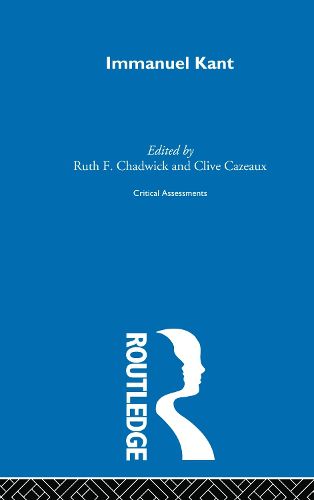Readings Newsletter
Become a Readings Member to make your shopping experience even easier.
Sign in or sign up for free!
You’re not far away from qualifying for FREE standard shipping within Australia
You’ve qualified for FREE standard shipping within Australia
The cart is loading…






Immanuel Kant is renowned for a dramatic shift in thinking about the world known as his Copernican Revolution. Experience is not the result simply of the mind’s passive receipt of sense impressions: rather, the mind actively organises our experience as experience of objects with qualities. We impose order on the world, applying categories which are universally valid. Since we actively shape experience, knowledge of the world is possible. The objects of experience conform to the knowing subject, rather than the other way round. We can have no experience which does not conform to the conditions Kant outlines, so we can know nothing of things as they are in themselves’. With this central thesis, Kant sought in his Critique of Pure Reason to answer the sceptic about the external world, while avoiding the illusions of speculative metaphysics. The notion of things in themselves’ has provoked criticism and debate right up to the present day Kant’s moral philosophy is still influential. The catagorical imperative has given Kant the reputation of the stern philosopher of duty for duty’s sake, but the dictum that we should treat rational beings as ends in themselves informs contemporary rights theories and the principle of respect for persons. In the Critique of Judgement , Kant not only deals with aesthetics and teleology but also sythesises and mediates between the other two Critiques . Immanuel Kant (1724-1804) was born in Konigsberg in Prussia. It is often claimed that he is the greatest philosopher in the history of modern philosophy, if not its entire history.
$9.00 standard shipping within Australia
FREE standard shipping within Australia for orders over $100.00
Express & International shipping calculated at checkout
Immanuel Kant is renowned for a dramatic shift in thinking about the world known as his Copernican Revolution. Experience is not the result simply of the mind’s passive receipt of sense impressions: rather, the mind actively organises our experience as experience of objects with qualities. We impose order on the world, applying categories which are universally valid. Since we actively shape experience, knowledge of the world is possible. The objects of experience conform to the knowing subject, rather than the other way round. We can have no experience which does not conform to the conditions Kant outlines, so we can know nothing of things as they are in themselves’. With this central thesis, Kant sought in his Critique of Pure Reason to answer the sceptic about the external world, while avoiding the illusions of speculative metaphysics. The notion of things in themselves’ has provoked criticism and debate right up to the present day Kant’s moral philosophy is still influential. The catagorical imperative has given Kant the reputation of the stern philosopher of duty for duty’s sake, but the dictum that we should treat rational beings as ends in themselves informs contemporary rights theories and the principle of respect for persons. In the Critique of Judgement , Kant not only deals with aesthetics and teleology but also sythesises and mediates between the other two Critiques . Immanuel Kant (1724-1804) was born in Konigsberg in Prussia. It is often claimed that he is the greatest philosopher in the history of modern philosophy, if not its entire history.